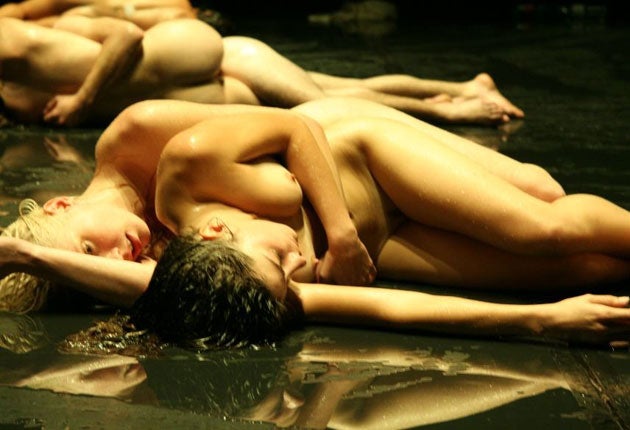David Lister: When audience participation resembles sexual harassment
The Week in Arts

Your support helps us to tell the story
From reproductive rights to climate change to Big Tech, The Independent is on the ground when the story is developing. Whether it's investigating the financials of Elon Musk's pro-Trump PAC or producing our latest documentary, 'The A Word', which shines a light on the American women fighting for reproductive rights, we know how important it is to parse out the facts from the messaging.
At such a critical moment in US history, we need reporters on the ground. Your donation allows us to keep sending journalists to speak to both sides of the story.
The Independent is trusted by Americans across the entire political spectrum. And unlike many other quality news outlets, we choose not to lock Americans out of our reporting and analysis with paywalls. We believe quality journalism should be available to everyone, paid for by those who can afford it.
Your support makes all the difference.When it comes to a night out at a show, the words that make me reach for my gun are audience participation.
Having been stupid enough to sit in the front row at the Comedy Store, and too near the clowns at Cirque du Soleil, I know more than enough about paying to be humiliated. But, of course, it can be extremely funny for every other member of the audience, and it's a bit precious to protest about it.
It's a different kind of audience participation that I find much more disturbing, the kind where you are subjected to cultural innovations which would have the performers arrested if they tried it on outside the theatre.
Take the Dave St-Pierre dance company from Canada which has been performing at Sadler's Wells theatre in London. Here is what The Independent critic wrote about them this week: "Dancers pounce on members of the audience, naked men waggling their genitalia in people's faces." Rudolf Nureyev it isn't, and great performance it wasn't according to the critic who found it a one-star yawn.
But whatever the level of performance, I wonder whether it is entirely fair on the audience for Mr St-Pierre, the choreographer, to tell his dancers to bring their genitalia into the Sadler's Wells stalls and wave them in the audience's faces. These are people who have just wined and dined at Islington's finest hostelries, and may not be in the mood for close encounters with Canadian privates.
I had similarly ambivalent feelings when I saw the Argentinian performance company De La Guarda, which undoubtedly enjoys critical acclaim for its spectacular, high-energy, rhythmic performances that involve flying and diving into the audience. As a preview of one of their shows put it, "Expect to get kissed, danced with, undressed, and even taken into the sky for a ride."
That much is certainly true, and I have witnessed it, though not actually experienced it as De La Guarda clearly didn't much fancy kissing or undressing me. The people they did kiss and undress tended to be female people. In artistic circles this is known as culturally diverse entertainment showing audience and cast interaction with a view to creating a high-energy, tactile involvement that breaks down the barriers between performer and spectator.
Outside of cultural circles it is known as groping.
It's a tricky one, this. What do you do, especially perhaps if you are a young woman, and you don't really want the attentions, groping, kissing and undressing from a troupe of performers, no matter how acclaimed they might be in the arts press? What do you do, whatever your gender, if you want your seat in the stalls not to include the extremely close proximity to Canadian genitalia?
There is, I'm afraid, no audience opt-out clause. There is no right of protest. Besides, if you do protest, it is much worse than being strait-laced or even prudish – it looks as if you have failed to appreciate cultural diversity. But my hunch is that not everyone does enjoy this sort of enforced audience participation. Some, indeed, might even think of it as sexual harassment – if such a phrase existed in the cultural lexicon.
Anonymity has its uses
Arts venues and their sponsors have been rather pleased this week that one national paper has decided to credit sponsors from now on in its reviews of plays, music and exhibitions, in the hope that this will encourage philanthropy in these difficult times.
But I think that arts institutions and philanthropists should pause before rejoicing. The assumption seems to be that all reviews are positive, and private sponsors can bask in the shared acclaim. Alas, this is not always the case. What happens when there is a bad review? Suppose it says: "All involved with this production/exhibition should be ashamed of themselves. And the sponsor is..."
I suspect that sponsors might soon look back fondly on the days of relative anonymity.
Not gone, and not forgotten
The former Pink Floyd man Roger Waters has been receiving deserved acclaim for his continuing European tour of the band's 1979 opus The Wall. I saw one of the performances, and it was a truly memorable gig. However, I was struck by one of the songs, which was called "Vera". It is a lament on how the famous Second World War singer had been forgotten, and contains the lyric "Does anybody here remember Vera Lynn... Vera, Vera, what has become of you?"
In 1979, when the song was written, the wartime singer must have indeed seemed a very distant memory. But more recently she has rather come into her own again. The nonogenarian has outlived two members of Pink Floyd, and in 2009 she actually had a number one album, which is more than ... well, enough said.
Roger might want to amend the lyrics of that one.
d.lister@independent.co.uk
Join our commenting forum
Join thought-provoking conversations, follow other Independent readers and see their replies
Comments